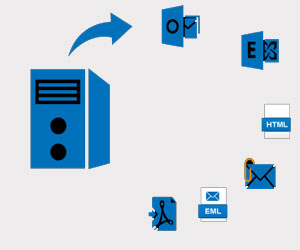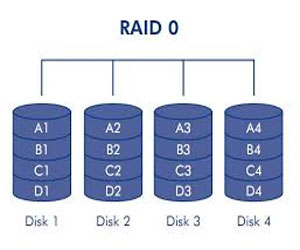Professional Help with Exchange Recovery Not all situations where you think you need exchange recovery are fixable via software tools. The included database repair tools in Microsoft Exchange are a solid bunch of tools, but certainly aren't a cure-all. When you find that you have a exchange server failure, it is critical to first assess the situation and exactly where the damage is originating from. Is this merely a database corruption problem? Has your exchange file simply been corrupted? Or are their hardware issues here. Knowing if you're suffering from the latter is key to understanding how to proceed. When HDD Failure Strikes Fact is, hard drives fail. And when a hard drive containing your company's Microsoft Exchange data fails, it can seem like the end of the world. It isn't - as long as you get the right professional to provide you with data recovery. This is mission critical data, and when the HDD is the problem, better to be safe and get help than potentially destroy data with DIY techniques.
Not all situations where you think you need exchange recovery are fixable via software tools. The included database repair tools in Microsoft Exchange are a solid bunch of tools, but certainly aren't a cure-all. When you find that you have a exchange server failure, it is critical to first assess the situation and exactly where the damage is originating from. Is this merely a database corruption problem? Has your exchange file simply been corrupted? Or are their hardware issues here. Knowing if you're suffering from the latter is key to understanding how to proceed. When HDD Failure Strikes Fact is, hard drives fail. And when a hard drive containing your company's Microsoft Exchange data fails, it can seem like the end of the world. It isn't - as long as you get the right professional to provide you with data recovery. This is mission critical data, and when the HDD is the problem, better to be safe and get help than potentially destroy data with DIY techniques.
Determining Why You Need Exchange Recovery
The process for determining why you're in a situation where you require exchange recovery is simpler than most people think. Making a quick diagnosis is something even the newest IT adminstrator can do, as it's all about observation, and not a lot more. With hardware issues, this is particularly the case. All you really need to do with Exchange servers in this case is listen to them... they will tell you the truth. Determining whether your Exchange database failure is just that or an actual hard drive failure is critical to how to restore your data. Actual hard drive crashes will mean physical symptoms, like a clicking or buzzing sound emanating from the case, will be fairly easy to spot. Additionally, if you cannot access the hard drive that your Exchange is on, you may also have a hardware issue. And when you have a hardware issue, understanding that software is not going to help will save you a lot of time.
Capable data recovery is available at these links:
http://www.shopmcallen.com/harddriverecovery/?
http://www.usemybusiness.com/harddriverecoveryassociates-ca.aspx
http://www.whereorg.com/Hard-Drive-Recovery-Associates-18705033
Does Anyone Want RAID 0 Data Recovery?
If there is a truly inevitable form of data recovery out there, it's RAID 0 data recovery. The reasons for this are pretty simple. First of all, you have the fact that hard disk drives are all inevitably built to fail. These are mechanical devices, after all, and all mechanical devices will fail at some point in time. Nothing human-made ever lasts forever. So you have that. What you also have when it comes to a situation where RAID recovery is necessary is a raid array setup that is basically faulty by design. RAID 0 is a setup created for performance only, as opposed to performance and safety. Unfortunately, with the performance boosted, the safety is all but destroyed. There is no redundancy in RAID 0. This means that any catastrophic hard drive failure will ensure that the raid array cannot be rebuilt. This is why few sound business owners ever take the risk, and manage to avoid RAID 0 recovery.
RAID 0 Data Recovery Will Be a Guaranteed Necessity for Its Users If there's one thing that should be said about RAID 0 data recovery, it's that it's pretty much inevitable. Certainly anyone who understands this kind of RAID array configuration has got to understand that a key part of what is the "RAID effect" is the fact that it includes a "redundancy factor". Not so with RAID 0 arrays. This platforms is not one of the originally intended definitions of RAID, and remains so. This is basically just a striped set of drives. It's meant for performance, yes, although questions have even come up by experts as far as how much that performance boost is. Many say nothing. Realistically, the problem with RAID 0 data recovery is simply that it shouldn't happen in the first place. Any IT administrator that sells his boss on RAID 0 as a storage platform should probably be fired! This is not a platform for anything but gamers and fools!
If there's one thing that should be said about RAID 0 data recovery, it's that it's pretty much inevitable. Certainly anyone who understands this kind of RAID array configuration has got to understand that a key part of what is the "RAID effect" is the fact that it includes a "redundancy factor". Not so with RAID 0 arrays. This platforms is not one of the originally intended definitions of RAID, and remains so. This is basically just a striped set of drives. It's meant for performance, yes, although questions have even come up by experts as far as how much that performance boost is. Many say nothing. Realistically, the problem with RAID 0 data recovery is simply that it shouldn't happen in the first place. Any IT administrator that sells his boss on RAID 0 as a storage platform should probably be fired! This is not a platform for anything but gamers and fools!
A Warning from RAID 0 Data Recovery Experts
One thing every savvy IT administrator should know: when you're talking about mission critical systems such as Oracle or Microsoft Exchange, using a RAID array is a good thing. But you have to be concerned about what RAID level you're working with. As someone very familiar with RAID 0 data recovery, I can tell you that RAID 0 is definitely not a choice for anyone but the most risk-taking newbie. RAID 5 at a minimum, yes. But dispelling the myth that a RAID 0 array is actually redundant at all is really a big part of a hard disk recovery expert's job. RAID 0 is strictly a motherboard manufacturer "bonus" that they slap on their boards in order to ship more units. It has proven again and again to provide little in the way of actual performance bonus, all with more risk than just using a regular hdd. In a word, avoid RAID 0.
Data recovery help is a click away:
http://www.wherezit.com/listing_show.php?lid=1284175
http://www.zipleaf.us/Companies/Hard-Drive-Recovery-Associates_41675
http://ylocale.com/cf/text_entries
Why RAID 0 Recovery is Growing As a Necessity
Ask a hundred hard drive recovery experts about RAID 0 as a safe platform, and brace yourself for one hundred decidedly negative opinions. The fact is, RAID 0 data recovery is the kind of service that can often be offered by even the lowest end data recovery companies, and although the increased reliance on RAID 0 has meant a lot of business for these companies, the fact is, this is simply not a platform for professional users. Frankly, it shouldn't be an amateur platform, either, and there are a few important reasons for this. RAID 0 Provides No Safety One of the things that is really confusing about the RAID 0 platform (and frankly, what is responsible for the massive increase in RAID 0 data recovery jobs) is the fact that it has no redundancy. This storage platform has for a long time been marketed as a performance builder only, and certainly isn't something that should be used by companies. Most IT managers know this. Rarely will a professonal RAID data recovery service encounter, say, an Exchange recovery job that includes the use of a RAID 0. It just doesn't make sense. In effect, RAID 0 is actually an "AID 0" because unlike most RAID-like platforms (such as RAID 1, even) there is not that backup disk. So the safety factor is simply expressed: it is in fact more subject to HDD failure than a single HDD, mainly because instead of having the percentage chance of a single hard drive going down, you have at least double the likelihood of failure because you have two hard disk drives. It's unsafe, frankly. Naturally, people usually don't discover the problems with the RAID 0 platform until it's too late. But it is slowly becoming common knowledge in the IT industry, which will at some point lessen the need for RAID 0 data recovery.